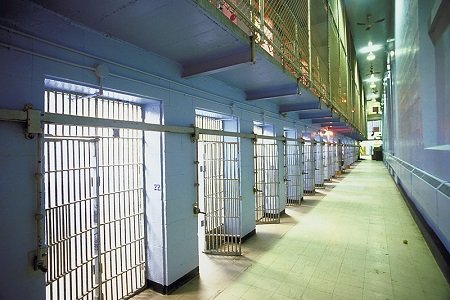“Poor people, people of color— especially are much more likely to be found in prison than in institutions of higher education.” —Angela Davis
Michelle Alexander, an associate professor of law at Ohio State University is the author of “The New Jim Crow: Mass Incarceration in the Age of Colorblindness.”
For many black students, Alexander believes the road to chronic imprisonment begins in grade school. She describes the school-to-prison pipeline as “part of a larger caste-like system where children are shuttled from their typically decrepit and under-funded schools to brand new, high-tech prisons.”
Young children are bombarded with the message that not much is expected of them, and they “are likely one way or another to wind up in prison.” In contrast, Alexander asks readers to “imagine a school district in which the white kids were the ones who were constantly being pulled out of class, kicked out of school, arrested and sent to jail, but all the black kids, or most of them, trotted off to college.” Outrage within the white community would be loud and strong.
However, “we’ve gotten accustomed to thinking of young black kids as troublemakers and underperformers,” says Alexander. “Their failures and suffering doesn’t disturb us as much, doesn’t defy our expectation. I think there is unconscious bias and stereotyping even among those of us who claim to care, and believe that we’re non-racist. We’ve all been socialized to have these perceptions and expectations of kids of color.”
This week Education Matters concludes its series: “Targeted for Cages Not Classrooms: Separate and Unequal School Punishment.”
Alexander met with education and social justice blogger, Rebekah Skelton for a Q&A session to examine the bias towards black children and make recommendations to stop this unfair treatment allowed to take place within our schools.
Rebekah Skelton: What would it take to change this bias?
Michelle Alexander: It would take a major shift in consciousness. We would have to blaze a new trail, an entirely different trail. It’s not simply about fixing a broken machine, but it’s really about rebuilding a system from the ground up. One that really values every child, no matter their color or class or background. One that imagines that each and every one of us has a contribution to make, that we make mistakes in our past.
It would require a radical shift away from this shaming and blaming, this punitive impulse, to a much more caring, compassionate, inclusive society. I think it’s possible. It’s the dream that Martin Luther King Jr. had and all the other advocates […] Some people have set that dream aside as largely utopian and said this is the real world, but I don’t think that the movement builders of earlier eras would have been satisfied with such a complacent approach.
RS: Do you consider juvenile interaction with the criminal justice system that starts in schools to be part of the system of mass incarceration?
MA: Absolutely. Young people are funneled into the criminal justice system— are targeted at young ages, often before they’re old enough to vote, by police who stop and search them, looking for drugs, looking for any evidence of infractions of any kind. They’re swept in at early ages.
Often if they go to the juvenile system they later graduate to the adult system, and once you’re released form the adult system you’re branded for life. You have a criminal record that will follow you for the rest of your life, authorizing legal discrimination against you in employment, housing, access to education, public benefits.
But even if as a young person you go to [juvenile] hall and are released without a criminal record, you will be scarred by that experience of incarceration. And as much as we like to think of juvenile detention as not prison, the reality is that it is experienced as prison for the young people who are there.
And that experience of being locked-up or shamed and stigmatized, treated like the embodiment of a problem, rather than as a young person who is in need of help, that experience scars young people for life, and fundamentally changes the way they view themselves and their place in our society.
We have got to abolish these prisons as we know them and be much more creative and compassionate and constructive and intentional about how we intervene in the lives of young people who are struggling and making serious or not-so-serious mistakes.
Jayne Matthews Hopson writes about education matters because “only the educated are free.”
